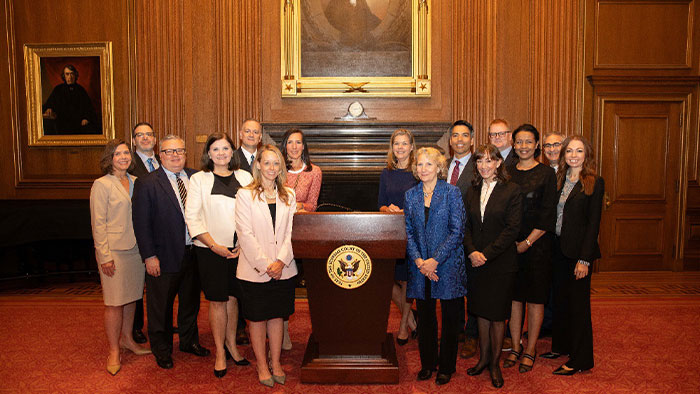ICPHSO Annual Meeting & Training Symposium 2022
- By [ Susan Kirsch , Luisa Lobo ]
- 03/04/2022
The Symposium included the perennial favorite Consumer Product Safety Commission (CPSC) morning featuring updates from senior CPSC officials and a round of live Q&A with the audience of nearly 400 product safety industry professionals. The following are some agenda highlights:
SUSTAINABILITY
Sustainability was at the forefront of this year’s Symposium, with each breakout session offering sustainability-related panel discussions. Specific topics included sustainability claims validation and the role of material certifications, developments in sustainable packaging, and achievements in innovative product design. The sustainable claims area continues to be an evolving and confusing landscape with disagreement around terminology nuances like “ocean plastic” versus “ocean bound plastic,” and the emergence of numerous unique marks for various sustainability attributes and combinations of attributes. Stakeholders will no doubt be looking to the Federal Trade Commission’s (FTC) 2022 Green Guides update anticipated in late 2022 for more guidance on making sustainable claims.
ADVOCACY COLLABORATIONS
Tuesday morning featured a plenary session on stakeholder collaboration on legislative efforts. Panelists included Tracey Kelly of IKEA and Brett Horn from Parents Against Tipovers/Charlie’s House. Tracey and Brett discussed how their collaboration was forged over the weeks and months that followed an initial conversation at the last in-person ICPHSO Annual meeting in February 2020 – a testament to the value of these face-to-face opportunities. They shared what they have learned along the way from tackling the confounding and often protracted legislative process, identifying a shared set of priorities, and keeping the lines of communication open. They continue to hold regular calls as they advocate for the passage of the STURDY Act, which was recently re-introduced with key changes they and other retailers and consumer advocates co-championed.
CONSUMER PRODUCT SAFETY COMMISSION
CPSC was center stage on Wednesday morning with plenary sessions that provided a 101 refresher on doing business with the CPSC, remarks from new CPSC General Counsel Austin Schlick, an “Ask the CPSC” rapid fire Q&A session with senior officials, and a keynote luncheon speech from Chair Alexander Hoehn-Saric. Schlick’s talk entitled “A Faster CPSC” sent a clear message that stakeholders should expect to see the Commission move more swiftly in escalating recalls, regulatory actions, and enforcement steps, and that it will continue to use all tools it has at its disposal—a signal that recent unilateral announcements and administrative complaints may become more commonplace.In addition to hearing from CPSC senior officials, attendees also heard from RILA Consumer Products Committee (CPC) Strategic Partner, Cheri Falvey from Crowell & Moring, who hosted a satellite session on recall reporting and how to avoid enforcement actions. Falvey shared that it is a common misconception that making a report to the CPSC will force a recall in every case. For this reason, companies may be hesitant to engage with the Commission. However, often early engagement with CPSC about a potential product safety issue can be a critical factor in avoiding penalties or recalls in general. Falvey emphasized that the earlier a company reports a potential problem or hazardous incident, the less contentious the recall process is likely to be. Bottom line: Timing is key to the recall process
SUPPLY CHAIN
Thursday morning featured a plenary session on the future of supply chain. Panelists for this session included Kim Mason of Five Below and Jennifer Bohaty of LL Flooring. Their conversation focused on the biggest challenges of 2021 and their key concerns and priorities for 2022, within the world of supply chain. One of the major challenges highlighted was the lack of boots-on-the--ground in overseas countries where supplier factories are located. The lack of a physical presence drove an uptick in remote audit inspections. Unsurprisingly, some of the priorities mentioned for the upcoming year included: Climate & ESG; better leveraging of technology and machine learning for data analysis; and managing in a virtual world.Outside of Thursday’s plenary session on the supply chain, ICPHSO hosted a benchmarking session on the challenges of small shipments within the supply chain. This session explored de minimus shipments and the efforts that are taken to identify, inspect and act on small shipments suspected of being counterfeit, stolen, or infringing on US intellectual property rights.
GLOBAL PERSPECTIVES
Breakout sessions highlighted the need to take a step back and level set some issues from a global perspective. For example, during “The Rules of Rulemaking” breakout session, panelists from CPSC and Health Canada provided a deep dive on rulemaking requirements and the timeline for different types of processes and the importance and differences between the various acronym-based terms (e.g., NPR, SNPR, ANPR, Final Rule, Briefing Package, APA).
STATE ISSUES
Another big picture session was “Exposing the current impact and trends of State-level Consumer Product Safety Restrictions.” With increasing activity across the US state-level regulatory landscape, panelists provided attendees a quick snapshot of how retailers and brand owners are currently addressing requirements and gave some recommendations as to how best to remain compliant as new restrictions and requirements are implemented.
FORESEEABLE “MISUSE,” COUNTERFEITS & MORE
The Symposium featured a variety of other breakout sessions, including sessions on foreseeable use and misuse, and counterfeit products. Panelists walked through examples of foreseeable misuse, as well as the science, key steps and thought processes behind a foreseeable use assessment. Panelists leading a session on counterfeit products detailed economic; health and safety; and covid concerns as they relate to counterfeit products. More specifically, they gave insight into different global initiatives that are working to combat counterfeit goods. On the U.S. legislative front, the SHOP SAFE Act aims to protect consumers by making internet retailers liable for harmful counterfeits sold online. The INFORM Consumers Act would require online third-party marketplaces to collect and verify basic contact and financial information from third-party sellers whose total sales exceed specified thresholds.* * * * * * * * * * * *
For more information on consumer product-related topics and RILA’s Consumer Product Committee, contact Susan Kirsch, Vice President, Regulatory Affairs at susan.kirsch@rila.org or Luisa Lobo, Manager, Legal & Regulatory Affairs at luisa.lobo@rila.org.


